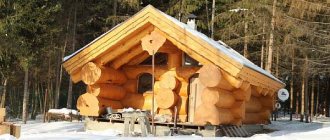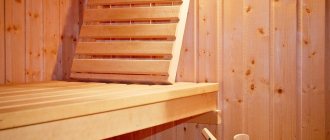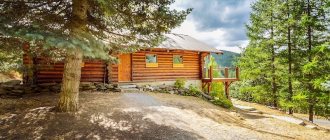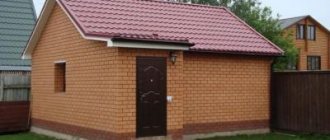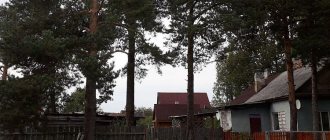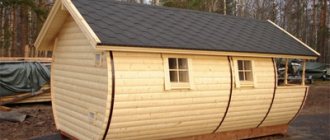The distance from the bathhouse to the neighbor’s fence is an important parameter of SNiP, SP and SanPiN, since the construction of such a structure must comply with three rules at once. The construction is regulated by building codes, which indicate acceptable distance standards, and not only from fences, but also to your own residential building and to the neighbor’s. As a structure that poses a potential fire hazard, the bathhouse is distanced in accordance with fire safety rules. It depends on them at what distance from the fence you can build a bathhouse.
In the village
Bathhouse construction standards and site requirements
The construction of a summer house is allowed on any type of plot within an urban and rural settlement, as well as on agricultural land. At the same time, the construction of a permanent structure is allowed for garden plots, and only temporary and outbuildings for garden land.
To build a bathhouse, the site must:
- located on an elevated area - to simplify the organization of drains;
- slope in any direction except north;
- soil with increased density and without swelling.
Bathhouse construction standards are regulated by:
- SP 30-102-99;
- SNiP 30-02-97.
New registration rules
On March 1, 2021, new property registration rules enshrined in Law No. 340-FZ came into force. Capital construction can be legalized only after the construction (planned or completed) has been approved by the local administration. If construction work has not been completed by March 1, 2021, it is mandatory to notify local authorities.
Permits will have to be obtained if the bathhouse is combined with a cottage or other residential building. If it is planned to build a commercial bathhouse on the site, its registration is also mandatory.
Distance to fence
Like any building, a bathhouse is a voluminous structure that can darken the neighboring area; it is also a source of increased fire safety.
According to SNiP, the distance from the bathhouse to the fence must be at least 3 meters, and it is important that the shadow of the building does not disturb the neighbors. The same distance must be maintained for the bathhouse sewer system if water is drained into a drainage pit. If there is a capital drainage trench with filtering components, for example, a mixture of graphite and sand, this distance can be reduced to 1 meter.
Distance to home
According to the standards, the distance of the bathhouse from the house depends on the materials from which it is built.
Minimum indicators:
- 8 meters for a brick bathhouse and a permanent house, both already built and under construction;
- 6 meters - if the bathhouse is wooden, but has a non-flammable roof, and the walls are impregnated with anti-flammable substances;
- 10 meters - if the bathhouse is completely wooden, and the house is made of brick or stone;
- 15 meters - if both objects are built from wood.
However, there are some nuances. For example, if there are no windows on the side of the neighbor's house facing your property, you can reduce the distance to it to 1 meter. And if you plan to heat the bathhouse with wood, the distance from other buildings should be maximum, and the smoke should not go towards the neighbors.
To measure the distance, take the protrusion of the base, and if there is none, the wall. Any protruding structure greater than 0.5 meters must be taken into account and used as a reference point. This requirement must be observed even when buildings are located on the same site.
Distance from bathhouse to bathhouse
Regardless of the type of building, standard guidelines apply for determining the distance between objects. This means that the distance from a bathhouse to another bathhouse should be the same as to a residential building - from 7 to 8 meters, depending on the construction materials.
Distance from red line
Ground and underground communications that run near the site are called the red line. According to sanitary standards, the bathhouse, like any other structure, must be at least 5 meters away from it. If the red line does not pass close to the site, you can reduce the distance between the bathhouse and the fence to 1 meter, provided that a distance of 5 meters is maintained between the building and the communications line.
Distance from natural bodies of water
If there is a river, canal or other natural body of water near the site, you need to take into account that the territories adjacent to the coastline are water protection zones (Part 1 of Article 65 of the Water Code of the Russian Federation).
According to Part 5 of Art. 65 VK, the distance at which buildings can be located depends on the length of the reservoir:
- from 50 meters, if its length is up to 10 km;
- 100 meters if from 10 to 50 km;
- 200 meters if from 50 km or more.
If the length of a river or stream is less than 10 km, only the coastal strip is a water protection zone.
Distance from trees to fence - planting standards according to SNIP
The height of the fence between neighbors in a private house according to the law
Removing buildings based on material of manufacture
The distance between the main and auxiliary building buildings determined by the standards prevents the transfer of flame to neighboring buildings in the event of a fire. This takes into account the material from which they are made, as well as the possibility of approaching them around the perimeter. That is, at the design stage, any factors that impede the provision of assistance in the event of an emergency are excluded.
Country cottage area
What distance should be between permanent buildings on your own and neighboring plots is indicated in the list below:
- Between stone, cast concrete, prefabricated reinforced concrete – 6 meters.
- The above type, but with floors made of wooden or non-flammable materials - 8 meters.
- Wooden frame buildings with the same fencing can be built at a distance of 15 meters.
- There is 6 meters between the stone fence and buildings with wooden floors.
- From stone fences (for example, brick, bordering frame buildings) - 10 m.
- The boundary between the wooden frame fence and the stone buildings is 6 m.
- From fences with a wooden frame to buildings with a wooden ceiling, the setback is 8 m.
- A fence with a wooden frame should be located 10 m from buildings made entirely of wood.
- The distance to the fence bordering the stone buildings with wood floors is 10 m.
Near the forest
Basic requirements for development
The procedure for planning buildings on your own site is the right of the owner, but sanitary standards and the rights of neighbors must be respected.
To avoid disputes regarding the placement of the bathhouse, you must strictly take into account:
- maintaining the distance to the neighboring fence to avoid complaints from neighbors to supervisory authorities;
- compliance with sanitary requirements and elimination of contamination of drinking water sources;
- take into account the direction of winds in the area so that smoke does not fall into the neighboring area;
- choose elevated areas for placement to prevent flooding in the spring and autumn;
- try to locate the entrance on the south side, where the snow melts faster - this way access to the bathhouse will be as simple as possible;
- take into account regional characteristics and requirements for the construction of this type of structure;
- negotiate with neighbors to reduce the distance if it is impossible to comply with the legal requirements for the placement of a bathhouse.
In the latter case, the agreement must be concluded in writing and certified by a notary. There is no point in building a bathhouse after your neighbor has verbally assured you that there are no complaints; it is better to secure all agreements legally and protect yourself for the future. However, it is worth considering that such an agreement is valid only with the current owner; if the neighboring plot is sold or it is inherited, you will have to re-negotiate with the new owner.
Fire safety
These requirements are regulated by the Federal Law of December 21, 1994 “On Fire Safety” No. 69-FZ.
Basic rules to consider:
- presence of a fire extinguisher;
- fire resistance or protective coating of materials in contact with the stove;
- compliance with the maximum heating of the walls up to 120 degrees;
- placing a metal sheet in front of the firebox to prevent fire in the event of ash or firebrands falling out;
- organizing a thermal gasket where the pipe passes through the ceiling; direct contact may cause the wooden roof to catch fire;
- high-quality ventilation that effectively frees the room from carbon monoxide in an emergency;
- inviting a representative of the fire service to start the stove for the first time and drawing up a fire safety report.
If the last requirement is not met and the first launch is carried out independently, you need to pay attention to:
- heating of elements - it must be uniform for all parts of the structure; if some are too hot, additional protective coating will be required;
- draft - when heating, smoke should not leak into the room through the cracks, and if there is no draft, it is necessary to clean the chimney.
For fire safety reasons, it is not recommended to lock the door during bath procedures.
Sanitary standards
In order for the bathhouse to be safe for the environment, you need to pay attention not only to the distance from other objects, but also to other indicators:
- individual sewage system in the absence of a central sewerage system;
- chimney tightness;
- uninterrupted operation of valves;
- the use of facing materials from environmentally friendly products so that toxic substances are not released - cheap plastic or chipboard cannot be used, and polystyrene foam is not allowed as insulation;
- equipped ventilation that prevents the formation of condensation and high humidity.
To register or not to register?
In Russia today, legislation simultaneously affects several branches of law, answering the question of whether it is necessary to register a bathhouse. It is important to take into account the requirements of housing, civil, tax, and land legislation relevant in 2021. In accordance with Art. 131 of the Civil Code of the Russian Federation, real estate requires mandatory state registration . But it is also worth considering that the bathhouse can be considered as:
- Temporary building. In this case, registration is not required.
- Real estate. Registration is required.
The difficulty is that it is difficult to determine what signs a bathhouse has. According to Art. 130 of the Civil Code of the Russian Federation, there are 2 main characteristics of real estate:
- Inextricably linked to the earth.
- Cannot be separated from the soil without causing great damage.
In other words, if the building is not temporary, it has a foundation, communications are connected, there are strong supporting structures, registration is required. In most cases, a bathhouse on the site must be registered.
If a neighbor built a bathhouse too close - what to do?
If a neighbor has started building a bathhouse in violation of the standards, you should contact him as soon as possible, because dismantling the building is easier in the early stages. But before you start a dispute, it is important to make sure that you have:
- correct cadastral passport;
- land survey plan;
- ownership.
For example, if we are talking about the plot of elderly parents, they may not have the entire package of documents, which will lead to the extra plot of land being transferred to the neighbor. You also need to make sure that none of the family members gave permission for this construction.
Having clarified these questions, you should contact your neighbor and explain to him that he is violating your civil rights and if he does not dismantle the building, you will have to deal with your defense in an administrative or judicial manner.
Regardless of which method of struggle you choose, it is worth sending a registered letter to your neighbor demanding that the construction defects be eliminated. It will serve as evidence of attempts on your part to resolve the issue peacefully.
Resolving the conflict administratively
If a neighbor refuses to clean a bathhouse built without compliance with regulations, you can file a complaint:
- to the local administration;
- the chairman of a garden non-profit partnership or a dacha non-profit partnership;
- to the prosecutor's office.
The complaint is drawn up in free form, observing the rules of business correspondence and indicating:
- these parties;
- the essence of the appeal - the presence of an illegal building in violation of regulations;
- listing the points of violation;
- demand for their elimination;
- dates and signatures.
Sample complaint
Sample complaint
It is also possible to draw up a collective appeal, for example, if an illegally installed bathhouse pollutes groundwater or soil.
All types of complaints are drawn up in the number of copies corresponding to the number of participants in the conflict, in the case of a collective appeal - according to the number of signatories. The document can be submitted in person (with a mark of acceptance) or sent by registered mail.
Going to court
If the dispute cannot be resolved pre-trial, you should go to court. In this case, it is possible to achieve not only the demolition of the unauthorized building, but also compensation for moral and material damage (for example, if the darkening of the bathhouse area prevented the uniform growth of the crop), as well as legal costs.
The statement of claim is drawn up according to the standard provisions of Art. 131 of the Code of Civil Procedure of the Russian Federation and indicating the same data as in the complaint, as well as information about attempts to resolve the issue pre-trial and the refusal of the neighbor to independently eliminate the violations.
Sample claim
Attached to it:
- passport;
- copies of pre-trial appeals;
- documents confirming your position: cadastral passport, land survey plan, act of illegal construction (if it is drawn up), etc.
The specific list depends on the situation.
Package of documents
To register a bathhouse on your own site, you will need to collect a package of documents. It includes:
- Application of the established form indicating the address where the building will be located.
- Documents certifying ownership of the plot (extract from the Unified State Register of Real Estate, certificate of title, contract).
- Passport of the owner (representative of the owner and power of attorney) or other identification document.
- Boundary plan of the land plot.
- Construction permit.
- Project documentation. The document specifies the necessary technical information (dimensions, number of premises, building materials, heating equipment and other categories of construction).
- List, location of utilities that are suitable for the building. Scheme, type, location of wastewater disposal systems, drainage system.
- Receipts for payment of state fees.
Arbitrage practice
The Kamensky City Court of the Penza Region considered case No. 2-22/2015, in which the plaintiffs demanded that the defendant demolish a bathhouse built in violation of town planning and construction standards, as well as fire safety and sanitary standards. The building is located too close to the site, and the slope of the roof is directed towards the plaintiffs' buildings. At the same time, the defendant stated that there was an oral agreement with the previous owner, who had no claims against him.
The court, having examined the case materials, took into account the absence of complaints from the previous owner, as well as the fact that the bathhouse was built in 2004, and the plaintiffs received ownership in 2011. At the same time, the fact of non-compliance with construction standards was established, but in itself it does not violate the rights of the plaintiffs and does not create a threat to their life and health, especially since the bathhouse has been operating since 2004 and no evidence was presented to the court that it is a source of danger.
Thus, the court refused to satisfy the claim in full, taking into account the fact that the demolition of the bathhouse significantly upsets the balance of interests of the defendant, and the plaintiffs did not present any other means of defense.
At what distance from the house can you drill a well: SNiP and SanPiN standards
The distance from the well to the house is one of the main SNiP standards, which are given special attention, as well as compliance with established standards during the construction of other sanitary facilities. In areas where there is no central sewerage system or centralized water supply, supervisory authorities require that attention be paid to the distance to a well, septic tank, septic tank and other sanitary and hygienic structures from a residential building. In such cases, when planning, one should be guided not only by the standards of SNiP and SP, but also by the requirements of SanPiN.
Lawyer's answers to private questions
A neighbor built a bathhouse close to my site, and besides, the slope of the roof is directed in my direction, causing snow and rainwater to flow onto my land. Where should I go to solve this problem?
You can file a complaint with the administration or prosecutor's office about illegal construction, as well as go to court. But before contacting the authorities, send a written request to your neighbor to eliminate the violations by registered mail.
Where to apply for a permit for a bathhouse if new neighbors complain that the construction is illegal, although it is in the BTI plan?
First contact the administration of your city with a request to legalize the design, and then go to court.
There is an old bathhouse, which was built on the adjacent territory of an apartment building. Recently, a neighbor complained about an illegal construction, and I received a notice of a fine of 5 thousand rubles. What do you think is easier: pay a fine and then legalize the bathhouse, or is it easier to demolish it?
If it is built on the territory of an apartment building, you will not be able to legalize it, especially since at least one neighbor is against it. Better demolish the structure and avoid the risk of repeated fines.
We added a bathhouse to our house wall to wall. The distance to neighbors is 5 meters, the size of the plot is 10 acres. Is it possible to get permission for it now or will I have to demolish the bathhouse as an illegal building?
If the distance requirement from neighbors is met, there is no reason for demolition. Contact the BTI, obtain technical and cadastral passports and register ownership in Rosreestr.
A neighbor built a dacha right next to my fence, it shades my area, and besides, smoke from the steam room is constantly coming towards me. What to do?
There are obvious violations of construction standards, so you can complain to the administration or file a lawsuit. In each case, the neighbor will be required to demolish the illegal building or remodel it in accordance with construction standards.
Project and its approval
The construction of a bathhouse or any other building in DNT or SNT, if it is built on a foundation, has a non-commercial purpose and must be carried out after obtaining permission from the architectural departments of local governments. Otherwise, it will be considered unauthorized construction, and it will not be possible to enter it into the state real estate cadastre retroactively, for example for 2021.
In the steam room
To obtain a construction permit, you must submit the following set of documents:
- statement, taking into account office work standards in the region;
- documents confirming the identity of the owner of the housing construction;
- documents evidencing the applicant’s right to carry out legal actions in relation to the land plot, the purpose of which is horticultural or other;
- topographical diagram linking the territory where construction is planned to the general plan of the settlement, with distances to the neighbor’s fence;
- cadastral plan of the site with dimensions in square meters or in acres and designation of how the land of the site is tied to the area;
- real estate assessment carried out by BTI;
- plan for the placement of communications on the site with points of connection to city utility networks;
- drawing of a new building on a summer cottage.
Distance to road
If it is planned to involve specialized companies for the construction of a bathhouse, then their specialists must undertake the preparation and approval of documentation.
This service is provided on a paid basis.
The video talks about the standard distances between buildings on sites in SNT and individual housing construction in accordance with Russian legislation.
Conclusion
The distance from the bathhouse to residential and non-residential buildings, water supply sources, site boundaries and other objects must comply with the requirements of SanPin and SNiP. This indicator depends on the characteristics of specific objects, construction materials, number of storeys of buildings and the type of engineering systems. Regional requirements may make regulations more stringent. It is recommended to think through these nuances in advance and create a project taking into account current legislation. In order not to face a refusal to approve the project, you can entrust the task to experienced specialists who know the intricacies of modern legislation and its latest changes.
Source of the article: https://stroychik.ru/normy/rasstoyanie-ot-bani
Consequences of incorrect placement
In drilling, the main thing is that the source shaft is located above the aquifer. It is necessary to choose a convenient location that provides access for the drilling machine.
Finding the aquifer is sometimes difficult. For better results, you should pay attention to some side factors:
- geological feature of the site;
- close proximity to surface water;
- typical plant species.
Sometimes it is worth doing exploratory drilling.
There are a number of other factors that must be taken into account when drilling. This is primarily protection from contamination. Incorrect location of the source can lead to runoff, industrial waste and landfills.
The minimum location from the septic tank is at least 30 m, and preferably 50 m. The distance from garbage heaps or industrial warehouses is 100 m or more.


